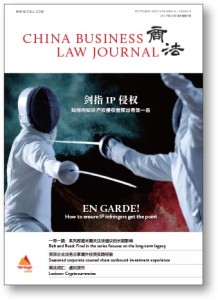Intangible assets such as reputation, knowledge, technology, etc., are a vital element for success in today’s business world. As China’s economy matures, the scramble for such assets is also becoming fierce. Do not take it for granted that your trademarks or patents are bound to be yours, whatever the circumstances.

En Garde! looks at how you should guard your IP against other players in the highly competitive China market. The good news is that Chinese legislators have shown increasingly lower tolerance for infringement – witness the large-value punitive damages awarded by courts in some recent cases.
The judicial system is also improving with facilitation of the trials of IP cases, and by adapting to the internet era, for example, by setting up specialized IP courts and an internet court in Hangzhou. However, realizing the importance of IP remains the most basic requirement if any company does not want to lose such valuable assets.
This issue also features the third and final article in our special series on the Belt and Road initiative. In the pipeline looks at the long-term implications of this massive undertaking.
For countries where key infrastructure projects are insufficient, it will not take too long for the benefits of the Belt and Road to be seen in the form of modern terminals, airports, railways and other big projects. But what will last longer, and is perhaps more important than those brand new constructions, is the entrenchment of an equitable rule of law in countries along the route. This legacy is especially valuable for countries where the legal regimes for doing business are yet to mature. The success of this initiative will upgrade both the physical and intangible conditions of the involved economies.
Investment under the Belt and Road initiative can pose big challenges, but so does outbound investment in general. For some Chinese investors, overseas markets that are not so popular can be uncharted territory in dangerous waters. In Navigating abroad, three seasoned corporate counsel share their practical insights and experiences regarding some topical outbound investment issues.
Their discussion covers antitrust issues in overseas markets, multi-jurisdictional compliance management, and how to build contractual bulwarks against legal uncertainty in some foreign markets. You may find these insiders’ opinions inspire or resonate with your own thoughts.





















